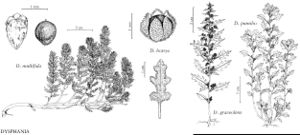Dysphania multifida
Ukrayins’k. Bot. Zhurn., n. s. 59: 382. 2002.
Plants perennial (possibly annual in some parts of its range). Stems prostrate or ascending, much-branched, 1.5–7 dm, densely puberulent. Leaves nonaromatic; petiole absent or indistinguishable from blade; blade oblong to elliptic, 0.6–4.5 × 0.1–1(–2) cm, base narrowly cuneate, margins deeply and irregularly pinnatifid with narrow, linear lobes, sometimes only dentate, apex acute to obtuse, glandular-pubescent abaxially. Inflorescences: lateral glomerules 1.8–3.5 mm diam.; bracts similar to cauline leaves. Flowers: perianth segments (4–)5, connate for most of their length, urceolate, tube with distinct reticulate veins, distinct portion 0.1–0.5 mm, margins dentate, apex rounded to broadly acute, accrescent and coriaceous with age, enclosing fruit; stamens 5; stigmas (2–)3(–5). Achenes obovoid; pericarp loosely adherent, membranaceous, with many yellow glandular hairs near apex, otherwise smooth. Seeds vertical, suborbicular to ovoid, 0.8–1.3 × 0.8–1 mm; seed coat smooth.
Phenology: Fruiting mid summer–late fall.
Habitat: Waste ground, sandy shores and ballast dumps near coast
Elevation: 0-700 m
Distribution

Introduced; Calif., Fla., Ga., Mass., N.J., N.Y., Oreg., Pa., S.C., Va., South America, introduced widely throughout the tropical and warm-temperate regions of world.
Discussion
Selected References
None.
